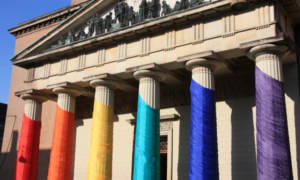Creating Welcoming Spaces
With shrill voices rising from diverse religious communities in opposition to gay marriage and equality on the basis of religious doctrines or beliefs, it is increasingly difficult as a gay person to feel welcome in almost any church. For many lesbian, gay, bisexual and transgender individuals (LGBT), church is remembered as a place of pain. Whether in open rejection and insult or in more subtle reminders that the beliefs of those in the pews around you are judging you very harshly, the presence of gays at many mainline Christian churches can be uncomfortable and unwelcoming for both regulars at the church and the gay visitor who wishes to join the worship ceremony.
Seven Steps
One representative of a college LGBT advocacy and education organization recommends seven steps to creating welcoming spaces and affirming place of worship.
1 – Know the History
For people who have been shunned, cursed, shamed and excluded in the past at church, trust may develop very slowly. It is important that religions and their leaders know and acknowledge the doctrines and events of the past that have hurt to be most receptive to the people who suffered those hurts.
2 – Understand Queer Issues
The general church populace may carry many attitudes and prejudices that grew out of earlier times. For LGBT communities to feel welcome and accepted, there must be true empathy and understanding of the life that is subject to prejudice and discrimination as many gay individuals live it. Talk openly in church about the pain of being excluded from marriage, fired from your job, or exiled from home as a youth due to one’s sexuality and gender identity. As church members come to see the unique struggles of their gay parishioners, community grows and tolerance increases.
3 – Nix Judging Language
All the talk of “loving sinners, but hating the sin” and being “healed” of desires or feelings is very painful to those who are being judged. The integral part of who they are that involves deep love and intimacy is being called broken, defective, sinful, and even evil. If church is to be an inclusive space, it must talk like it and act like it.
4 – Creating Welcoming Spaces
Given the history of hurt, it is very difficult for many gays to open their hearts and walk through the church doors. Churches that truly welcome and desire gays to worship with them will publicly announce their welcome, with web posts, rainbow flags, and church literature and statements that affirm equality in those pews.
5 – Speak to All
Welcome guest ministers who can represent all views in the flock. Regular church leaders and pastors must deliver sermons that speak to all of the congregation, not just the percentage that has been there all along. Make the doctrine and statements of the church align with the stated policies of acceptance and equality.
6 – Consider the Families
In planning church events and childcare, as well as the basic curriculum of classes, consider same-sex families and their needs. Educating children in tolerance and acceptance of families that appear different from their own is crucial.
7 – Open Leadership
As gays are welcomed to the church community and accepted in policy and action, the hope is that the entire body of the organization comes to reflect the diversity and range of individuals who worship there. When LGBT individuals have a seat at the table leading the ministry, policies of openness thrive, and all feel more welcomed.
Building a Ministry on Equality
The very notion of religion is built on welcoming all who desire to worship to come together as a community, without judgment of one another, to praise something that is greater than all the individuals together. Ministries and churches that emphasize love and acceptance are likely to grow more rapidly than another group that preaches judgment of one another. Everyone who is religious has a choice of where to gather with a like-minded community, so those who create the most welcoming space with their ministry are those who will enjoy the benefits of the most diverse community of believers.















